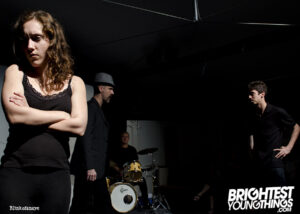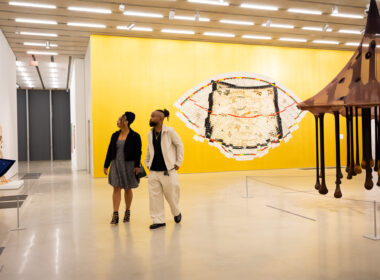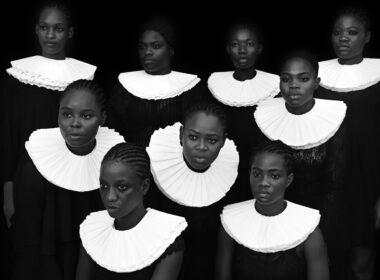Sugarcane Magazine’s Iva Marc had the pleasure of interviewing Meshaun Labrone whose starring in the stage play DARK HO– USE. This production is inspired by William Faulkner’s Absalom! Absalom! written by Tarpley Long and directed by Tracey McMullen. The sold out opening night is July 12, 2013 and is part of the Capital Fringe Festival in Washington D.C.
Sugarcane (SC): Without disclosing too much, could you briefly discuss the play Dark House?
Meshaun Labrone (ML): It’s a very interesting play about love, gentrification and actually reveals a lot about DC after the 1968 riots of the assasination of Martin Luther King, Jr. My character Quentin Compson is a realtor who wants to make a big deal on this house that was owned by the Sutton family. Their leader’s, Thomas Sutton, drive to be successful made the family very interesting. The woman whose coming in to speak to me, Ms. Coldfield, reveals the story of the ups and downs, the joys and a lot of pain about the family. I don’t want to talk too much about the play but the writer, Tarpley Long did a great job in taking this story Absalom, Absalom, Faulkner’s book, and adapting it into a play. She did a really good job of taking this story set in the 1800s and placing it in the 60s. And if people are familiar with Faulkner, they will be pleasantly surprised with what she was able to do with this play.

SC: It’s always fascinating how writers can find the connection between the present and the past and go from there without neglecting the present story and making it relevent. I absolutely believe that history repeats itself until we learn the lesson.
ML: This is definitely a storyteller’s play. If you love storytelling, if you love to hear someone reveal all of these truths – all of these different characters through storytelling this is definitely the play for you. And in order to sell this house, my character has to find out more and more not necessarily about the house, but about the family who lived there. This whole back and forth takes place between him and Ms. Coldfield, the last remaining member of the family. She speaks to me about the house and the family. If you love storytelling this play is definitely the one for you.
SC: Wonderful, it sounds like the story is happening through you, but then there’s flashbacks.
ML: Right, absolutely. There are quite a few flashbacks. We see Thomas Sutton, Ms. Coldfield – the other characters Judith and Henry and his other son (laughing) from his previous marriage who had white skin and “nappy hair” (laughing). Mr. Sutton wasn’t to pleased about that.
SC: He has to take responsibility for that – she didn’t do it on her own. (laughing)
ML: (laughing) Right, right he wasn’t pleased about that. He wanted to have the perfect life, he wanted to have the perfect wife, perfect son that could take over the empire he was trying to put together. But he put together a kingdom, an empire of broken dreams, broken hearts and a lot of dead bodies. (laughing) That’s his empire, that’s his legacy. You get to catch all the gruesome, heartbreaking details and then there’s the black maid or sibling Clytemnestra. She was the love in the house. She was the only one that kept love alive in the house. Of course, that was our job. It wasn’t so much about us cleaning, but they would come to us for advise about how to dress, decorate the house, how to cook, and how to raise the children. So keeping the family together was also their duty. Keep him happy, keep her happy, keep the children happy, the dog happy, and the horses happy. Even though, this play is set in modern times, going back to the 60s, it was still her duty to do that. And she did it to the best of her ability – to keep the love alive and the family in tact.

SC: Sounds so exciting. You gave just enough, Meshaun, to really peak the interest. The readers will be like “ugh, I wonder what happens next.” (Laughing). Very good!
ML: I think our opening night will be sold out. Tickets are selling rapidly. We’ve been featured twice as the play to see at Fringe.
SC: Very exciting. Congratulations on that.
ML: Thank you.
SC: Now, let’s discuss the writer Tarpley Long. She has a psychotherapist, psychoanalyst background.
ML: She’s a very fascinating lady. She’s really interesting. My family coming from Tallahassee and her family is from the south too. When we get together and talk, I always find it interesting to talk to people who lived back then and they just so happen to be white and hear their take on things. I’ve always found that interesting. She was in DC during the riots in 68. She knows the history of DC. When she was referring to different things in the play, I’m like wow, she was there she didn’t read about it. She lived it. I know I’m getting off a little. DC is just now coming back from the riots.
SC: In what way?
ML: Some of those areas that were burned down are just now being rebuilt in 2013. They are just now bringing businesses back to those neighborhoods. A former police officer, who worked during the riots, said maybe 10 years ago, they finally found the last remaining body of a person, who died during the riots, on top of an abandoned building. It lets you know how much the city itself had been neglected. Most of those areas are predominately black. The play touches on all of that. I think Tarpley has done a really good job on this adaptation. She’s a really interesting woman.
SC: When you were discussing how the police found that last body, the thought came to me about how long it takes us to heal. A part of the healing process is connecting with the past as we work to put it behind us. It can take such a long time sometimes.
ML: Absolutely.
SC: How much of Tarpley’s psychology background do you see in the play?
ML: I think you see quite a bit, especially from my character. My character wants to make the sale and be the listing agent for this property. It can go for millions. This can make his year. But, also in searching for his beginning because he never knew his father, he finds out about the character, Charles Bon, Thomas Sutton’s illegitimate son, not having a father. His father abandoning him because he has white skin and nappy hair. He’s trying to find answers for why someone would do that. Even though he’s asking this about Charles, he’s actually asking about himself. So he kind of reveals himself, his little secret. The subconscious is being revealed. He finds that he can relate to being abandoned and he asks why would someone abandon his child? Does the father ever think about him, does my father ever think about me? Does he know I exist, does the father know that guy exist. Charles never met his father. All he knows is that he went to an Ivy League school. I remember telling the director, this black experience of not knowing your father, is a reality for so many of our boys. Regardless of the socioeconomic level; whether you’ve grown up upper, middle or lower class, still 70% of our children are being raised in single parent households and most of those households are being ran by the mother. A lot of them don’t know their father. Looking for those answers are right there: Where were you, why did you abandon me? That’s how a child feels. Most of them don’t understand the complexity of a relationship and how things just don’t work out. Why did you leave me? You see that being revealed through my character. You can see elements of that through the play and how memory plays a huge part in the storytelling and in the damage that has been done to us as individuals as we grow. In a way, this play is a form of healing for those that lived and live in DC and those of us that are dealing with racism and sexism. It offers us a chance to see how ugly racism is and try to finally do something about it. And it takes an individual to look at the situation and try to be honest and make a conscious effort to say that’s what it is and I don’t want to have anything to do with that. I think this play does that.
SC: Fabulous.
ML: Now, that I’m older and I know what kind of artist I am. The plays that are saying something, that have a social, political message are the ones I gravitate towards. I was just so happy when they hired me to be in this play. We have a great cast and crew.
SC: You grew up with your father, what obstacles/objectives did you deal with to become this character who did not have his father?
ML: As an actor, you have to just pretend and even though I had my father, the obstacle of having to identify with this character who never knew his father, was not so much of a challenge because I deal with boys on the regular with the Our Generation group (OG). These young men do not know their father and the rest that do know their fathers have no connection with them at all. There’s no sense of father at all. I listen to them, I watch their mannerisms, and I watch their behavior. I follow them and listen to how they speak about their experiences. I see how they have to puff out their chest to prove that yeah, I am whole, but in actuality how can a young man ever really be whole unless he has a father there to show him how to be a man; to be a complete individual. He has the mother there to show love, but you have to have the father there to show discipline, to show manhood, to show that strength, to show him that responsibility. Yeah, a mother can do that, but I could drive with my knees while texting (laughing), but it doesn’t mean that’s a good idea. I just watch these individuals and try to implement that with my character. Quentin has to show and prove – “yeah, I can do that.” (with a pompous voice). My father told me, “to get something done you don’t have to yell, you don’t have get mad, you don’t have to curse, you don’t have to fight, just be a man and stand on your principles and that’s it – just be a man. Wow, you mean, I don’t have to yell, I don’t have to curse, I don’t have to showboat? No, you don’t have to do that. Just work hard, make your demands, stand on your principles and that’s it.” So, this character is flashy – yeah it’s part of the business, but he’s trying to overcompensate for the loss and emptiness he’s dealing with.
SC: Fantastic. I was reading something today that talked about not always trying to prove yourself and just be love. When you’re just love, you don’t have to prove yourself – love is that wholeness – love is equated to wholeness. You just be you. Always great talking to you Meshaun, we get so deep.
ML: I enjoy it. That’s why I’m here. I enjoy it.
SC: The themes in the play are classism, racism, miscegenation, incest, murder, suicide and the twists and turns of love within a family living in the Logan Circle Mansion. How is your character developed by these themes? How is Quentin woven by these themes?
ML: He’s woven into these different themes just by listening to the story. Ms. Coldfield is telling him all these things, so through her storytelling he’s coming face to face with these characters and learning from them. Even though things look perfect on the outside, it reveals the ugliness of the world itself. The house looks so beautiful, so pristine and the family looks so nice, but he learns about all the ugliness that went on inside the home. So that’s the connection between him, the story and all the ugly isms that we’re talking about. One of the ugliest things that’s happening to him is the emptiness and that’s how he’s connecting with all of those different themes. It happens with most of us, we have this beautiful appearance but we have a lot of things, unresolved issues and ugliness within that have never been revealed. At first, he’s just listening to the stories for the sale, but now he’s becoming caught up in it. You talking about me now, my emptiness, my loneliness, my things are being revealed here. I need some answers some help. The audience will hear the story and see it revealed. They will be able to see all those nasty little things that took place in the Sutton family.
SC: Alright now. (laughing) Beautiful.
ML: (laughing)
SC: What drew you to this character?
ML: Originally this character was actually going to be white. And Tarpley thought it would be more interesting to have this character be black. As a result of doing Fringe last year, my name was given to the director, Tracey. We corresponded and there you have it. Looking at the character, this was something I’d never played before. As I began to study the character, the play and learned more about Faulkner, I really began to understand the place of this character in this story and the time period. I’m very, very happy that I’m a part of the storytelling in this production. I think it really needs to be told. Even though, he’s quick with the smile, comments and a real hard worker, he still has that emptiness and longing inside.
SC: Just to piggyback off of what you were saying, it was very clever of Tarpley to want your character, Quentin, to be black because I feel like it opens the door for our people to have that conversation about our emptiness.
ML: And not only that, the Georgetown area, where the play takes place, black people were over there originally. A lot of the camps during the civil war were set up there. Slave camps were there and here it is this guy doesn’t care about any of that. He’s from Chevy Chase, up north in Maryland, so he could give a shit about any of the historical context of the area. He just wants to make money. And that’s how we are right now, we just want to make money. It’s so sad, so unfortunate. I don’t care about any historical significance. I don’t care about our people suffering. Just show me the money. There’s nothing wrong with wanting to be financially stable and having a healthy economy in your household, but we think that’s what our freedom is. That’s not what freedom is.
Freedom isn’t about buying this suit or leasing a Lexus like most of us do. That’s not the pursuit of happiness, I don’t think. I think the pursuit of happiness is becoming one with yourself and having a complete understanding of who you. What is your significance in time and space? When you have knowledge of yourself, you know who you are, then you can have a healthy love for yourself. When you have a healthy love for yourself you wouldn’t need all of that other stuff. We’re always that donkey chasing the carrot and we’re so focused on that carrot you don’t see that the donkey is leading you off a cliff. At the end of the day, you can have all these things around you and you’re still sitting there feeling empty. I thought it was really interesting that this character has so much. I’m sure this isn’t his first time he tried to sell a mansion worth millions, but he’s still sitting here saying where’s my father, whose my father, does he wonder about me? He’s still sitting there asking these questions. You’d think with the money he’s made with being a realtor, he’d be alright, but he’s not. That’s how we are as a people. We’ve made some strides here and there, but we’re not ok. Having a thorough knowledge of who you are is what’s going to fill the void, but we don’t want to deal with that.
SC: I believe everything plays a role including setting. What’s the significance of the Logan Circle Mansion? How is that playing a part in the play?
ML: If I remember correctly, Logan Circle during the civil war was one of the places where they relocated ex-slaves in DC. I find it interesting that 22 Logan Circle is where this mansion is, especially when you talk about characters like the racist attitude of Thomas Sutton. I think the playwright did that intentionally. She knows quite a bit about the history of DC. Black people are the foundation; we’re the founding fathers. Without us, there would be no America, no United States, no 4th of July. We’ve always been that glue that keeps the country together. We fought in every single war and made the country the richest on planet earth.
SC: I read a summary of Faulkner’s novel, Absalom, Absalom, which the play is based on, and there is so much drama, so many players, about 16 named characters. It truly is a modern day mix of Jerry Springer/Maury Povich and any daytime soap. In other words, there’s so much drama, at every turn, so much comes to light. How closely or loosely connected is the play Dark House to the novel?
ML: The characters are similar, but its not that closely connected. The only thing that’s closely related are the isms . The want for greed, power, leaving your legacy and passing it down. Quentin picks up on that as he deals with his need to say he’s going to show himself to be a powerful individual. That’s what we do as black people. We take on the negative attributes of society and adapt them instead of taking the positive attributes that we’ve forgotten and focus on them. Television will make sure that we look at the greed, power and money and say that’s what it is to make it in this country. That’s what it takes to be a human being in this country. No. So that same thing is in Absalom, Absalom. Faulkner wrote about this in the 1800s and it’s still going on in the 21st century. We are spiritually poor. Whenever you see your children in the condition that they’re in you’re in trouble because that signifies you have no spirit, because your children are the keys to eternal life. When your children are healthy spiritually, mentally and physically then you will live on. You cannot die.
SC: Awesome closing remarks, Meshaun. Sugarcane thanks you again. It is always a pleasure.
You can purchase tickets at:
The running time is 75 minutes, recommended for adults only due to the profanity.
The dates and times are:
Friday, July 12 – 7:15pm,
Friday, July 19 – 6:15pm,
Sunday, July 21 – 12:45pm,
Wednesday, July 24 – 6:00pm,
Friday, July 26 – 8:00pm,
Saturday, July 27 – 11:45pm.
This production is present as a part of the 2013 Capital Fringe Festival, a program of the Washington, DC, and non-profit Capital Fringe.










